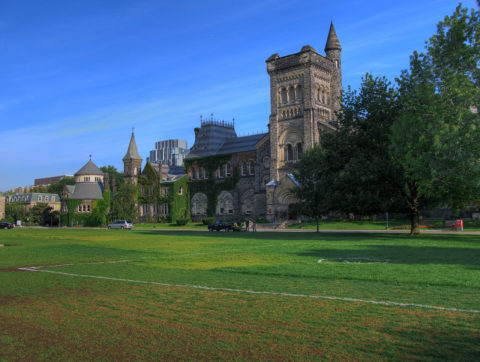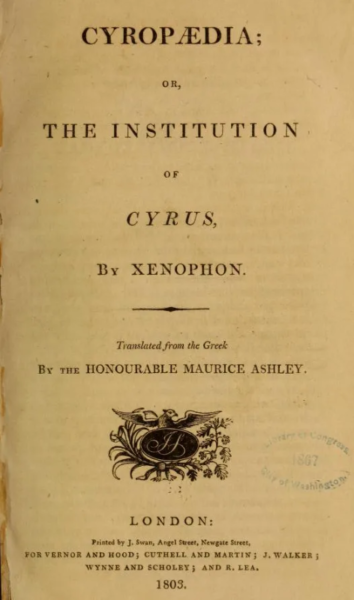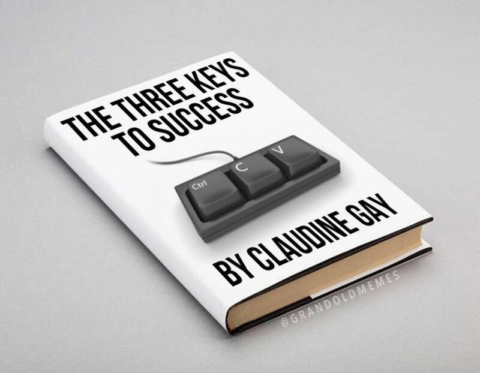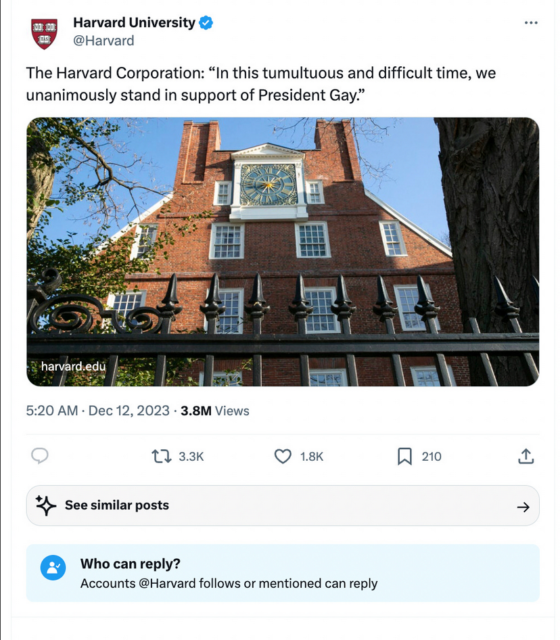This is therefore, in its over-reach, ideology masquerading as neutral scholarship. Take a simple claim: no aspect of our society is unaffected by the legacy of slavery. Sure. Absolutely. Of course. But, when you consider this statement a little more, you realize this is either banal or meaningless. The complexity of history in a country of such size and diversity means that everything we do now has roots in many, many things that came before us. You could say the same thing about the English common law, for example, or the use of the English language: no aspect of American life is untouched by it. You could say that about the Enlightenment. Or the climate. You could say that America’s unique existence as a frontier country bordered by lawlessness is felt even today in every mass shooting. You could cite the death of countless millions of Native Americans — by violence and disease — as something that defines all of us in America today. And in a way it does. But that would be to engage in a liberal inquiry into our past, teasing out the nuances, and the balance of various forces throughout history, weighing each against each other along with the thoughts and actions of remarkable individuals — in the manner of, say, the excellent new history of the U.S., These Truths by Jill Lepore.
But the NYT chose a neo-Marxist rather than liberal path to make a very specific claim: that slavery is not one of many things that describe America’s founding and culture, it is the definitive one. Arguing that the “true founding” was the arrival of African slaves on the continent, period, is a bitter rebuke to the actual founders and Lincoln. America is not a messy, evolving, multicultural, religiously infused, Enlightenment-based, racist, liberating, wealth-generating kaleidoscope of a society. It’s white supremacy, which started in 1619, and that’s the key to understand all of it. America’s only virtue, in this telling, belongs to those who have attempted and still attempt to end this malign manifestation of white supremacy.
I don’t believe most African-Americans believe this, outside the elites. They’re much less doctrinaire than elite white leftists on a whole range of subjects. I don’t buy it either — alongside, I suspect, most immigrants, including most immigrants of color. Who would ever want to immigrate to such a vile and oppressive place? But it is extremely telling that this is not merely aired in the paper of record (as it should be), but that it is aggressively presented as objective reality. That’s propaganda, directed, as we now know, from the very top — and now being marched through the entire educational system to achieve a specific end. To present a truth as the truth is, in fact, a deception. And it is hard to trust a paper engaged in trying to deceive its readers in order for its radical reporters and weak editors to transform the world.
Andrew Sullivan, “The New York Times Has Abandoned Liberalism for Activism”, New York, 2019-09-13.
February 5, 2024
QotD: The history of slavery in America
February 3, 2024
QotD: The Postmodernist’s Dilemma
If Leftists could see the obvious consequences of their own positions, they wouldn’t be Leftists. We know this. But since it’s their world, and we have to live in it as best we can, it helps to go back and spell out those obvious consequences from time to time. The biggest, most obvious one of all is what I’m going to call The Great Contradiction. It’s the obvious next step from the Great Inversion: If “whatever is, is wrong”; then all authority, everywhere, is illegitimate — which includes the authority proclaiming The Great Inversion.
We could also call it “the PoMo’s Dilemma”, since this stuff originated in the ivory tower back in the Sixties, and finally broke containment in the late Seventies. Most intellectual fads quickly become caricatures of themselves, but in their haste to get to the next hot new thing the PoMos decided to cut to the chase. Postmodernism started as a self-parody. Put simply but not at all unfairly, PoMo is the assertion for a fact that there is no such thing as a fact. There is no Truth, just “truth”. No eternal verities, just perspective, just discourse; it’s all — say it with me now — “just a social construction”.
I suppose we must give the early PoMos credit for having — in a thoroughly Postmodern way – the courage of their convictions. When Alan Sokal invited the PoMos to try transgressing the Law of Gravity from his twenty-first floor apartment window, the goofs from Social Text published a “rebuttal” to Sokal, informing him, a working physicist, that they, the English Department, understood physics better than he did. He meant it as a joke, but he was really right all along about the so-called “law” of “gravity”.
That was 1996. At that point, any sane society would’ve had the editors of Social Text dragged out of the faculty lounge and shot in the middle of the quad, pour encourager les autres. But of course we chose not to. And why would we? Being close to three decades deep into the Great Inversion by then, we got much barmier stuff than anything Social Text published in freshman orientation. Stick it to The Man, we were told, and don’t trust anyone over thirty …
Severian, “Hoist on Their Own Petard”, Rotten Chestnuts, 2021-04-19.
January 30, 2024
The foul “nudgers” are at it again at Cambridge
Christopher Gage reports on a recent fun-reducing experiment by paid psychological meddlers at Cambridge University:

“Wineglass” by quinn.anya is licensed under CC BY-SA 2.0 .
Researchers found they could “nudge” people into drinking less wine when they denied the unsuspecting blighters a large 250ml measure.
Last summer, these wholly well-adjusted people convinced 21 Cambridgeshire pubs and restaurants to offer only small or medium glasses of wine. The result left the boffins breathless. But sadly, not in the medical sense of the word.
When denied a large, vivifying glass of wine, the subjects drank eight percent less than usual, and the pubs didn’t lose any money — smaller measures cost more. Puritans: two. Oenophiles: nil.
The usual suspects cooked up this obscene waste of time and money. Professor Dame Theresa Marteau, director of the behaviour and health research unit at Cambridge University, boasts lurid form in control freakery.
Her previous studies read like an almanac of neurotic impulses. The mad mullah dreams of shrinking plates and sinking sodas. This finger-wagger-in-chief obsesses with the vinous, porcine masses and what they may slip into their faces when she’s not looking. Marteau chillingly laments that large wine glasses “increase the pleasure of drinking wine”.
The fundamentally nosey swear these are the first murmurs of Utopia. Next, they’ll bend boozing regulations into a truncheon to batter the gastronomic swine over its head. They don’t stop. First, they shrink the large glass. Then, the medium glass affects as the large. What happens next? Take a wild guess.
This is not the work of some rogue Colonel Kurtz. One Daily Telegraph writer seized on the study. Employing the presumptuous “we” beloved of oppressive minds, they offered tips to help us drink less, assuming we drink large wines only because we are weak-willed effigies desperate for professional helpers to show us what’s best for us.
Advocates of “nudging” drive themselves senseless over this psychological thimblerig. The potential to correct “undesirable” behaviour proves too great to resist. They are a species of featherless biped with which I share nothing but the right to a trial before a jury of my peers.
As I write, I’ve just returned from a five-mile jaunt with 33 pounds strapped to my back. Loading a bag with weights burns double the calories. Therefore, whatever I do after that trek is my business alone. On my desk is a large glass of Portuguese red blend. Beside that soul-tingling measure sits a smouldering, hand-rolled, menthol-tipped cigarette.
Why strangers stake their mental well-being on what others put into their bodies, I will never know. Why they wish I’d sit here choking on sparkling water and its vegetable equivalent — celery — I’ve not the foggiest of insights. All I do know, friends, is that I am not the one in dire need of a few sessions with a psychoanalyst. My professional advice: Seven letters. Vulgar slang. A phrasal verb rhyming with “duck cough”.
York University’s CUPE local apparently cribs their homework from the Völkischer Beobachter
York University’s contract and part-time instructors are represented by CUPE local 3903, who’ve distributed an eye-openingly anti-semitic document with the (implied) order to interrupt normal tutorials and replace the content with Palestinian propaganda:

Detail from an official “toolkit” distributed to York University contract and part-time faculty which claims that their employer is complicit in “genocide” by the mere tolerance of Jewish groups on campus.
Photo by A Toolkit on Teaching Palestine
A new toolkit circulated to York University teaching assistants instructs them to denounce Israel at every available opportunity, even when it has no apparent relevance to the subject being studied.
“Let us collectively divert this week’s tutorials to teaching on Palestinian liberation,” reads the 15-page document circulated by CUPE 3903, the union representing York’s contract and part-time faculty.
The document adds that tutorials should be diverted to condemnations of the “Zionist Israeli state” regardless of the course that the TA is supposed to be discussing.
“It is a medical issue. An arts issue. A feminist issue. A society issue. A political issue. A cultural issue. A geography issue. An engineering issue. An architecture issue,” it reads.
The document is filled with claims denouncing Israel as a genocidal “colonial project”. Canada is treated much the same, and is referred to alternately as the “Canadian settler state” or “Turtle Island”.
The mere presence of Jewish groups on campus is also referred to as evidence of York University’s “complicity” in genocide.
The document denounces the existence of sanctioned “Zionist cultural institutions”, making explicit reference to Hillel, the world’s go-to Jewish campus organization. York is also called an accessory to genocide because of its research links with the Hebrew University of Jerusalem.
The pamphlet even provides a script for TAs to read as they inform students that the tutorial will be cancelled in favour of becoming a “teach-in … for liberation.”
“Today, I open up our classroom to bring our attention on Gaza, to speak up and stand in solidarity with the Palestinian liberation movement, and contribute in ending Canada’s and York’s complicity with genocide and the settler-colonial occupation of Palestinian land and life,” reads one introductory line.
January 28, 2024
Adolescence is “a profoundly unnatural life-stage”
Sarah Hoyt on the plight of the younger Millennials and the Gen Z kids in our over-supervised safety-at-all-costs culture today:

Child labour laws did generally get younger children out of dangerous places like mines, mills, and factories. Modern child labour laws instead keep young adults from gaining work experience in many cases.
Photo of pre-teen children working in a mill in Macon, Georgia in 1909. Photo NCLC.01581, Library of Congress via Wikimedia Commons.
Mostly, it gets attributed to “kids these days” but unless you have kids, these days, you don’t know how they are bound. And even if you do, you might not realize it, because all you see is the infantilization of a generation, and not that they, themselves, aren’t the ones doing the infantilizing, but all those “good rules” and regulations and laws are doing it.
I realized about 10 years ago that my son’s generation was about 10 years behind where we were. In their mid twenties they were doing things we did in our teens. It was disconcerting. And even I had no idea why, other than too much regimentation in school, too much of a never end of button counting, and not enough room or freedom to think or be on their own.
Since then … I’ve seen more. And a lot of the reason they are younger than we were is that the entire world is geared not to let them grow up. I mean, let’s be glad that — unprepared or not — they’re legal adults at 18, or people would be denouncing them for walking alone down the street, without an “adult” at 25.
There’s also … adolescence is in some ways a profoundly unnatural life-stage, and more or less invented in the 20th century. In the past, sure, people were children, and people grew to be adults, but there wasn’t this protracted time period where they were adults in size and at least some ability, but weren’t allowed to be adults: they weren’t allowed to earn or spend, or make their own decisions, for years.
The earn or spend thing is important. Kids used to grow along with their tasks. Read Tudor or colonial memoirs, and you find four year olds looking after cows or horses, or learning Latin, or other unlikely things even for twelve year olds in our time.
Mom went to work at 10 and started getting a salary. It wasn’t much, and 90% of it went to her parents’ budget. But she was working, holding down a job, doing things that were maybe not at adult level, but could lead to it, eventually, if she applied herself. This was normal for her generation. In my own generation, amid the working class, most people went to work at 10. Heck, amid the middle class, most people went to work at 15 or so, after 9th grade. Were they more mature than the rest of us that went all the way to college?
I wouldn’t have thought that at the time, but yes, of course they were. Most of my elementary school classmates were married, with kids by the time my biggest worries were final exams. Of course, with my intellectual pride I looked down on them but now I understand they were managing a very difficult job, which at the time I could not have done.
I always feel stunned and shocked when someone says the kids should be “holding down two jobs like I was at 16” or “working to pay their way through college”. (That last is a giggle as it has two impossibilities. Finding a job that pays enough after college which has a lot of make-work expectations, and making a full-time middle-class salary, which is what college costs these days.) Two Jobs. At 16. The difficulties in giving work to 16 year olds, increasingly restriction of hours, etc. combined with chaotic scheduling in the only unskilled jobs remaining (mostly just retail) means that until recently none of them could find A job. Let alone two. And the recently was during Covid. I haven’t seen so many little 16 year olds cashiering, or serving at tables recently. And that’s because most people I’m seeing are around my age: I guess unemployment is biting hard.
But you know, all these strong rules against “child labor” mean that most kids hit 18 or, if they’re going to college, 22 or — more likely, as most degrees (remember make work?) are taking 6 or 7 years — 24, with absolutely no job experience. Which means their applications aren’t even looked at. Not seriously.
Honestly, almost every young person — particularly young men — I know who found a job, and is doing relatively well, did so through contacts. Through friends of friends. Through knowing someone.
This is a bad sign, because it’s how Portugal functions, and it is not in any way shape or form meritocracy, which in turn contributes to other things falling apart.
But more and more what I’m seeing is young people hitting their mid twenties lost, and doing this, and doing that, and trying this and trying that, and nothing ever gels. To make things worse, they don’t have the habits mom had by 10, because they haven’t been allowed to acquire them.
There was a similar generation — one, while here we’re well into two — in Portugal, where unemployment was so bad (the generation before mine) that most people weren’t “established” on a path till their mid thirties. I’d guess about half of them never got the knack of it: of the day to day of working, fulfilling the work duties, just … the unglamorous day to day that makes us adults.
QotD: Never depend on “surveys” for real-world issues
There’s a reason “social science” is all horseshit, and that reason is: surveys. All of this stuff is based on surveys, and as it happens, I have quite a bit of experience of being on the receiving end of these. You see, back in grad school I was involved with a young lady in the Soash Department — I know, I know, but a man has certain needs, ya feel me? — and so I was always on call to take whatever goofy little tests they dreamed up, as a favor to her and her equally spastic hardcore Lefty friends. Anecdotes aren’t data, of course, but I’ve got a lot of anecdotes, and I can tell you — anecdotally — that there are two huge, self-reinforcing problems with these surveys: a) respondent pool, and b) design.
The respondent pool is, overwhelmingly, college kids taking them for class credit. Knowing what we know about Basic College Girls, who again are the majority of all college kids, is it any surprise that the results just happen to confirm the conclusions the slightly older, but no less Basic, Grad Student Girls were looking for? Throw in the design problem — questions about as subtle as “Do you think all races should be treated equally, or are you a monster?” — and you’ve got scientific proof that Liberals are good people and Conservatives suck.
Severian, “Is vs. Ought II: Moral Foundations Theory”, Rotten Chestnuts, 2021-04-20.
January 27, 2024
Modern academics “were perfectly happy to accept that evolution explains the behaviour of every other species on earth, with the exception of humans”
In the National Post, Gad Saad offers an action plan to bring our universities back to a slightly more reality-based view of the world and prevent further postmodernist deterioration:

University College, University of Toronto, 31 July, 2008.
Photo by “SurlyDuff” via Wikimedia Commons.
This year, I am celebrating my 30th year as a professor. During those three decades, I have witnessed the proliferation of several parasitic ideas that are fully decoupled from reality, common sense, reason, logic and science, which led to my 2020 book, The Parasitic Mind: How Infectious Ideas Are Killing Common Sense. As George Orwell famously noted, “There are some ideas so absurd that only an intellectual could believe them”. Each of these ideas were spawned on university campuses, originally in the humanities and the social sciences, but as I predicted long ago, they have infiltrated the natural sciences, and now can be found in all areas of our culture.
These destructive ideas include, but are not limited to, postmodernism (there are no objective truths, which is a fundamental attack on the epistemology of science); cultural relativism (who are we to judge the cultural mores of another society, such as performing female genital mutilation on little girls?); the rejection of meritocracy in favour of identity politics (diversity, inclusion and equity (DIE) as the basis for admitting, hiring and promoting individuals); and victimhood as the means by which one adjudicates between competing ideas (I am a greater victim therefore my truth is veridical).
I was first exposed to this pervasive academic lunacy via my scientific work at the intersection of evolutionary psychology and consumer behaviour. Central to this endeavour is the fact that the human mind has evolved via the dual processes of natural and sexual selection. Nothing could be clearer, and yet I was astonished early in my career to witness the extraordinary resistance that I faced from my colleagues, many of whom were perfectly happy to accept that evolution explains the behaviour of every other species on earth, with the exception of humans.
Apparently, human beings transcend their biological imperatives, as they are strictly cultural beings. This biophobia (fear of using biology to explain human phenomena) is the means by which transgender activists can argue with a straight face that “men too can menstruate and bear children”. Biology is apparently the means by which the patriarchy implements its nefarious misogyny, making us all “wrongly” believe that men can on average lift heavier weights and run faster than women, notwithstanding a litany of evolutionary-based anatomical, physiological, hormonal and morphological sex differences.
According to radical feminists, these differences are largely due to social construction. Hence, a man who stands 6-4 and weighs 285 pounds can wake up one day and declare himself to be a transgender woman. Anyone who disagrees with this notion is clearly a transphobe.
January 25, 2024
QotD: How Meritocracy morphed into “Meritocracy”
The current meritocratic system began as an effort to open up a hereditary WASP elite to outsiders — and for a while, as immigrants, minorities, and women earned their way into America’s legacy campuses, writes Markovits, it looked like it was working more or less as intended. In the last few decades, however, the system has morphed into a do-or-die tournament for the prize of an Ivy League degree and a bonus-rich job at a swanky address. Instead of being democracies of talent, Harvard and Yale and their elite cronies are now quasi-exclusive clubs for the children of wealth. Money gives rich parents the means to groom their kids for these clubs as early as infancy with classes, books, and trips to museums meant to enhance kids’ development. They move to wealthy neighborhoods, where schools offer a vast array of (ahem) “enrichment” activities, including test prep and college-essay tutoring. Alternatively, they put their kids through 12 years of $40,000-a-year-plus private schools, whose administrators just happen to be chummy with Princeton admission officers.
Their efforts pay off for their progeny, but in the harsh competition that is the contemporary economy, they leave everyone else in the dust. Nourished in the hothouse of elite homes and communities, rich children have pulled away from their middle-class counterparts when it comes to academic performance, outscoring them on the SAT by twice as much as middle-class kids outscore poor students. The most elite colleges enroll more students from households in the top 1 percent than from the entire bottom half of the income scale. Those students are first in the pipeline to elite jobs. Top banks go only to the Ivy League, MIT, and Stanford for their recruiting. Top Five law schools are the training grounds for partners at the poshest firms. Meantime, middle-class kids are not only a rare sight on elite campuses; they’re also far less likely to get any college degree. Poor kids do worse still.
The result, says Markovits, is precisely the sort of dynastic elite that the putatively unbiased SAT was supposed to put out of business. To the dismay of his critics on the left, Markovits is not entirely unsympathetic to the winners of the tournament. The rich used to be indolent, he reminds us. The whole point of wealth was to be freed from toil, while peasants sweated in fields and manor kitchens to serve their betters and eke out a living for their undernourished families. These days, by contrast, the rich work 16-hour days and weekends under immense competitive pressure to close the deal, make partner, and take a conference call with Japanese businessmen. “No prior elite has ever been as capable or as industrious as the meritocratic elite that such training produces. None comes close,” Markovits asserts. Yes, a few actresses and real estate barons try to bribe and cheat their children into the palaces of learning, but most Ivy Leaguers have used their privileged upbringing to make their way into these bastions according to the rules of achievement. Given the expensive grooming required to make it to the top campuses, he implies, a squeaky-clean meritocracy would still favor the rich.
Kay S. Hymowitz, “Meritocrats versus Meritocracy”, City Journal, 2019-10-11.
January 16, 2024
QotD: Children and transgenderism
And then there is the disturbing “social justice” response to gender-nonconforming boys and girls. Increasingly, girly boys and tomboys are being told that gender trumps sex, and if a boy is effeminate or bookish or freaked out by team sports, he may actually be a girl, and if a girl is rough and tumble, sporty, and plays with boys, she may actually be a boy.
In the last few years in Western societies, as these notions have spread, the number of children identifying as trans has skyrocketed. In Sweden, the number of kids diagnosed with gender dysphoria, a phenomenon stable and rare for decades, has, from 2013 to 2016, increased almost tenfold. In New Zealand, the rate of girls identifying as boys has quadrupled in the same period of time; in Britain, where one NHS clinic is dedicated to trans kids, there were around a hundred girls being treated in 2011; by 2017, there were 1,400.
Possibly this sudden surge is a sign of pent-up demand, as trans kids emerge from the shadows, which, of course, is a great and overdue thing. The suffering of trans kids can be intense and has been ignored for far too long. But maybe it’s also some gender non-conforming kids falling prey to adult suggestions, or caused by social contagion. Almost certainly it’s both. But one reason to worry about the new explosion in gender dysphoria is that it seems recently to be driven by girls identifying as boys rather than the other way round. Female sexuality is more fluid and complex than male sexuality, so perhaps girls are more susceptible to ideological suggestion, especially when they are also taught that being a woman means being oppressed.
In the case of merely confused or less informed kids, the consequences of treatment can be permanent. Many of these prepubescent trans-identifying children are put on puberty blockers, drugs that suppress a child’s normal hormonal development, and were originally designed for prostate cancer and premature puberty. The use of these drugs for gender dysphoria is off-label, unapproved by the FDA; there have been no long-term trials to gauge the safety or effectiveness of them for gender dysphoria, and the evidence we have of the side effects of these drugs in FDA-approved treatment is horrifying. Among adults, the FDA has received 24,000 reports of adverse reactions, over half of which it deemed serious. Parents are pressured into giving these drugs to their kids on the grounds that the alternative could be their child’s suicide. Imagine the toll of making a decision about your child like that?
Eighty-five percent of gender-dysphoric children grow out of the condition — and most turn out to be gay. Yes, some are genuinely trans and can and should benefit from treatment. And social transition is fine. But children cannot know for certain who they are sexually or emotionally until they have matured past puberty. Fixing their “gender identity” when they’re 7 or 8, or even earlier, administering puberty blockers to kids as young as 12, is a huge leap in the dark in a short period of time. It cannot be transphobic to believe that no child’s body should be irreparably altered until they are of an age and a certainty to make that decision themselves.
I don’t have children, but I sure worry about gay kids in this context. I remember being taunted by some other kids when I was young — they suggested that because I was mildly gender-nonconforming, I must be a girl. If my teachers and parents and doctors had adopted this new ideology, I might never have found the happiness of being gay and comfort in being male. How many gay kids, I wonder, are now being led into permanent physical damage or surgery that may be life-saving for many, but catastrophic for others, who come to realize they made a mistake. And what are gay adults doing to protect them? Nothing. Only a few ornery feminists, God bless them, are querying this.
In some ways, the extremism of the new transgender ideology also risks becoming homophobic. Instead of seeing effeminate men as one kind of masculinity, as legitimate as any other, transgenderism insists that girliness requires being a biological girl. Similarly, a tomboy is not allowed to expand the bandwidth of what being female can mean, but must be put into the category of male. In my view, this is not progressive; it’s deeply regressive. There’s a reason why Iran is a world leader in sex-reassignment surgery, and why the mullahs pay for it. Homosexuality in Iran is so anathema that gay boys must be turned into girls, and lesbian girls into boys, to conform to heterosexual norms. Sound a little too familiar?
Adults are increasingly forced to obey the new norms of “social justice” or be fired, demoted, ostracized, or canceled. Many resist; many stay quiet; a few succumb and convert. Children have no such options.
Indoctrinate yourselves as much as you want to, guys. It’s a free country. But hey, teacher — leave those kids alone.
Andrew Sullivan, “When the Ideologues Come for the Kids”, New York Magazine, 2019-09-20.
January 12, 2024
“… normal people no longer trust experts to any great degree”
Theophilus Chilton explains why the imprimatur of “the experts” is a rapidly diminishing value:
One explanation for the rise of midwittery and academic mediocrity in America directly connects to the “everybody should go to college” mantra that has become a common platitude. During the period of America’s rise to world superpower, going to college was reserved for a small minority of higher IQ Americans who attended under a relatively meritocratic regime. The quality of these graduates, however, was quite high and these were the “White men with slide rules” who built Hoover Dam, put a man on the moon, and could keep Boeing passenger jets from losing their doors halfway through a flight. As the bar has been lowered and the ranks of Gender and Queer Studies programs have been filled, the quality of college students has declined precipitously. One recent study shows that the average IQ of college students has dropped to the point where it is basically on par with the average for the general population as a whole.
Another area where this comes into play is with the replication crisis in science. For those who haven’t heard, the results from an increasingly large number of scientific studies, including many that have been used to have a direct impact on our lives, cannot be reproduced by other workers in the relevant fields. Obviously, this is a problem because being able to replicate other scientists’ results is sort of central to that whole scientific method thing. If you can’t do this, then your results really aren’t any more “scientific” than your Aunt Gertie’s internet searches.
As with other areas of increasing sociotechnical incompetency, some of this is diversity-driven. But not wholly so, by any means. Indeed, I’d say that most of it is due to the simple fact that bad science will always be unable to be consistently replicated. Much of this is because of bad experimental design and other technical matters like that. The rest is due to bad experimental design, etc., caused by overarching ideological drivers that operate on flawed assumptions that create bad experimentation and which lead to things like cherry-picking data to give results that the scientists (or, more often, those funding them) want to publish. After all, “science” carries a lot of moral and intellectual authority in the modern world, and that authority is what is really being purchased.
It’s no secret that Big Science is agenda-driven and definitely reflects Regime priorities. So whenever you see “New study shows the genetic origins of homosexuality” or “Latest data indicates trooning your kid improves their health by 768%,” that’s what is going on. REAL science is not on display. And don’t even get started on global warming, with its preselected, computer-generated “data” sets that have little reflection on actual, observable natural phenomena.
“Butbutbutbut this is all peer-reviewed!! 97% of scientists agree!!” The latter assertion is usually dubious, at best. The former, on the other hand, is irrelevant. Peer-reviewing has stopped being a useful measure for weeding out spurious theories and results and is now merely a way to put a Regime stamp of approval on desired result. But that’s okay because the “we love science” crowd flat out ignores data that contradict their presuppositions anywise, meaning they go from doing science to doing ideology (e.g. rejecting human biodiversity, etc.). This sort of thing was what drove the idiotic responses to COVID-19 a few years ago, and is what is still inducing midwits to gum up the works with outdated “science” that they’re not smart enough to move past.
If you want a succinct definition of “scientism,” it might be this – A belief system in which science is accorded intellectual abilities far beyond what the scientific method is capable of by people whose intellectual abilities are far below being able to understand what the scientific method even is.
January 10, 2024
The problem of engaging with “the great classical works”
The first book review for 2024 at Mr. and Mrs. Psmith’s Bookshelf is a look at Xenophon’s Education of Cyrus by John Psmith:
It is easier, given his nature, for a human being to rule all the other kinds of animals than to rule human beings. But when we reflected that there was Cyrus, a Persian, who acquired very many people, very many cities, and very many nations, all obedient to himself, we were thus compelled to change our mind to the view that ruling human beings does not belong among those tasks that are impossible … We know that Cyrus, at any rate, was willingly obeyed by some, even though they were distant from him by a journey of many days; by others, distant by a journey even of months; by others, who had never yet seen him; and by others, who knew quite well that they would never see him. Nevertheless, they were willing to submit to him.
I am not well-read in the classics. My excuse ultimately boils down to the same argument that all the classicists give for why you should be well-read in the classics: reading a book that has been widely admired for a very long time isn’t just reading a book, it’s entering into a “great conversation” taking place across the aeons. I feel awkward reading a book like that without knowing something about the commentaries on the book, all the people it has influenced, all the people who influenced it, the commentaries on the commentaries, and so on. It’s exhausting and overwhelming, and when I ignore all that and plunge ahead, I often don’t enjoy the book and then I feel dumb. A “great conversation” sounds nice, but only if you’re one of the participants and you actually get the inside jokes and references. Otherwise it’s as alienating and isolating as showing up to a party where you don’t know anybody, and where everybody else has already been chatting for a few thousand years.
I don’t remember who recommended Xenophon’s Cyropaedia to me or how it wound up on my reading list, but when it finally made its way to the top of my stack, I saw it and shuddered. How could I possibly appreciate this semi-fictionalized biography of the founder of the Persian Empire without first being familiar with Xenophon’s work as a mercenary for one of Cyrus the Great’s distant descendants? Or with all the ways he was riffing on and responding to the political philosophy of his frenemy Socrates? Or with the complicated politics of the Peloponnesian War, and the way that Xenophon, an Athenian exile and the original Sparta-boo, was actually writing PR for King Agesilaus II, but concealing it within a story about the exotic Persians?1 Or with how this book led to the creation of an entire major genre of books in the Middle Ages? Or with the most famous and subversive instance of that genre, Machiavelli’s The Prince, and with all the hundreds of subsequent works reacting and responding to that one?
You see the problem? One could very easily conclude that it would be impossible for me to appreciate this book. Fortunately, I ignored all that and read it anyway. No doubt I missed all kinds of subtle layers of meaning and nuance, but even read on a totally superficial level by an ignoramus, this book rocks.
The title has the word “education” in it, but the book covers Cyrus’s entire life and reign, and only the first section concerns his education in the literal sense. That first section is very important to what comes next, though, so I’m going to dwell on it a bit. Cyrus, along with the other Persian boys of his social class, is being trained to lead. And so their education is centered around having lots of opportunities to judge, instruct, and coerce others; but also opportunities to serve and obey. If you’re old enough, you might remember when the education of the American leadership class worked this way too, but even those of you who are younger have seen vestiges of it in the bizarrely disproportionate weight given to extracurriculars in US college admissions.
1. If you’re an American, then you’re already familiar with this trick. Most of our debates about the virtues and vices of other nations are just thinly-veiled attempts to “own” domestic political opponents.
January 5, 2024
The value of college degrees
Ted Gioia isn’t a college dropout, but he’s seen enough to realize that given how his career has gone, he might well have saved himself a lot of time and money by not going to university in the first place:
I spent almost a decade and huge sums of money — much of it borrowed in the form of student loans — to earn multiple degrees from elite institutions.
But I don’t have a degree in music — the field that became my vocation. And I never took a single course or lesson in jazz (my specialty) during my entire life.
I wasn’t a dropout, not even close. But it’s sobering to consider my life in retrospect, and see how much it relied on what I taught myself outside of the classroom. So I now have a very different view of college than I did back when I was a student.
My more mature view is as follows:
(1) A college degree is more about signaling your worth than about learning.
This is hardly a brilliant insight — many are now saying this. But when you’ve lived it yourself, it changes your perspective on everything.[…]
(2) College provides inspiring role models — but they also exist in other settings.
I was blessed with a small number of teachers and mentors who taught me by example — and most of this happened at high school and college. There is no substitute for seeing greatness in the flesh at close hand.But this can happen outside of college — my wife, for example, had those experiences working as a dancer and choreographer in New York. She learned more from her mentor Erick Hawkins than from any college professor.
[…]
(3) Dropping out is a real option with genuine upside, but it’s not for everybody.
Let me put it as simply as possible: Many successes are dropouts, but few dropouts are successes.I would advise against abandoning your education for simple reasons of avoidance — because classes are a hassle, tests are a bummer, etc. But if you have a genuine vision of your life and the skills to achieve it, college is purely optional. And perhaps even hazardous.
(4) As the college experience becomes more expensive and close-minded, the appeal of alternatives increases exponentially.
At what price does college become a bad deal? I don’t have an answer to that, but we must be close to a tipping point.If I tried to replicate my formal education today, it would cost ten times as much. I would have student loans as large as the national debt of a mid-sized country. That’s just ridiculous.
But this kind of irrational endpoint results when a bloated bureaucracy increases tuition at more than the inflation rate every year — and continues doing so for a half century. The people running our major universities think they can get away with this because customers want impressive diplomas, and can be squeezed to an infinite degree.
But infinity doesn’t actually exist in human affairs. And unsustainable trends eventually prove just that, namely that they are unsustainable.
(5) The smartest people will increasingly bypass the system.
I can’t emphasize this enough. My advice to young people today is very different from what I would have said just 5 years ago.I now tell them to find ways to work outside of bureaucratic legacy institutions.
[…]
(6) Dropouts really do change society.
As someone who invested so much time and money in big-ticket credentials, that’s painful to admit. But I’ve seen too much to ignore the facts. I now grasp that people who are genuine visionaries know at an early stage that they can teach themselves, think for themselves, and manage themselves. Those are more valuable skills than any degree.So maybe I didn’t drop out like my friend’s buddy at Harvard, back in the mid-1970s. But I wouldn’t laugh at the idea nowadays, the way I did back then. And if I had everything to do over again, I might drop out myself.
Qatar’s Aggies
In The Free Press, Eli Lake discusses the deal between Texas A&M and the Qatari government that gives the Qatar Foundation — run by the Qatari royal family — full ownership of any intellectual property developed at the Qatari campus of the university:
What does Qatar get for its investment in U.S. universities? The answer may surprise you. In addition to the prestige and the influence of affiliating one’s national philanthropy with elite schools, Qatar is also accumulating the kind of technical research that was once the prize of American universities.
Consider Texas A&M University, one of the best places in the country to study nuclear engineering. Last month, The Free Press obtained exclusive access to a copy of the latest contract between Texas A&M and the Qatar Foundation that shows all of the intellectual property developed at the university’s campus in Doha belongs to the Qatar Foundation, a national philanthropy owned by the country’s royal family.
“The Qatar Foundation shall own the entire right, title, and interest in all Technology and Intellectual Property developed at (Texas A&M University Qatar) or under the auspices of its Research Program, other than those developed by non-TAMUQ employees and without financial support from the Qatar Foundation or any of its affiliates,” says the contract, dated May 25, 2021.
This kind of arrangement is common for large research universities in America. But TAMUQ is not your ordinary university. It is entirely funded by the Qatar Foundation. Kelly Brown, a spokeswoman for Texas A&M, told me that Qatar “pays for all faculty and staff salaries” as well as the physical campus, labs and equipment, housing, transportation, and travel allowances for professors.
It’s no small matter. The intellectual property generated by Texas A&M University in Qatar, or TAMUQ, includes highly sensitive research in a variety of fields ranging from computer science to bioengineering. Last year, TAMUQ inked an agreement to develop projects with a subsidiary of Barzan Holdings, Qatar’s largest arms manufacturer.
Andre Conradie, the CEO of the joint venture between Barzan and Germany’s Rheinmetall, said at the time, “This partnership will encourage the development of technological and operational capabilities to enhance military protection.”
As one of the country’s premier schools in nuclear engineering, Texas A&M has access to two nuclear reactors in Texas not affiliated with the U.S. government. In December, the National Nuclear Security Administration renewed a contract for the university, along with the University of California and Battelle Memorial Institute, to manage the Los Alamos National Laboratory, which involves oversight of teams who design and maintain nuclear weapons for the U.S. government.
January 4, 2024
“Missing from Gay’s note was some important … context”
Oliver Wiseman and Bari Weiss consider the resignation-under-pressure of Harvard President Claudine Gay:
Why did Claudine Gay step down yesterday as president of Harvard? In a letter announcing the bombshell decision, Gay wrote that it was in “the best interests of Harvard for me to resign so that our community can navigate this moment of extraordinary challenge with a focus on the institution rather than any individual.”
She also blamed racism: “It has been distressing to have doubt cast on my commitments to confronting hate and to upholding scholarly rigor — two bedrock values that are fundamental to who I am — and frightening to be subjected to personal attacks and threats fueled by racial animus,” Gay wrote in her email Tuesday.
Missing from Gay’s note was some important … context.
In particular, there was no mention of the twin scandals that have plagued Gay and captured the attention of the country in recent weeks. The first: her handling of antisemitism and free expression on Harvard’s campus since October 7, including her appalling appearance before Congress in December.
The second: the ever-growing list of plagiarism allegations against Gay. On Monday night, the dogged journalists over at The Washington Free Beacon reported six more charges of plagiarism. That brought the number of allegations against Gay close to 50 and implicated half of her published works in the scandal. The next day, Gay was gone, making her the shortest-serving president in Harvard’s history: the Kevin McCarthy of higher ed.
Within minutes the crowing began. Major props went to Bill Ackman, the billionaire investor who has relentlessly criticized his alma mater since the attacks of October 7; to Chris Rufo, the Manhattan Institute senior fellow who was early on the story of plagiarism allegations against Gay; and to Free Beacon reporter Aaron Sibarium (more about him in a minute).
But does Gay’s resignation — and apparently she will remain on the faculty — actually change things?
Our sense — and recent events have only reinforced it — is that Claudine Gay is only the symptom of a deeper rot, both at Harvard and across higher education more generally.
One of the people who has been outspoken about that deeper crisis is Jeffrey Flier, who was the dean of Harvard Medical School from 2007 to 2016 and is a member of the Council on Academic Freedom at Harvard, a group founded by Harvard academics last year to fight the free speech crisis on their campus. (Harvard ranks dead last with a score of 0.00 in FIRE’s college free speech rankings.)
We spoke to Flier hours after Claudine Gay’s resignation. He said he sees the present crisis as a chance for the university to fix itself. “Her departure may have been necessary. But the university needs to do more than appoint a new president,” he explained.
“Before October 7, few people thought fixing problems at Harvard was a really urgent need. I am with a group that wanted real change, but relatively few people were listening. But now there is real opportunity for change,” explains Flier.










